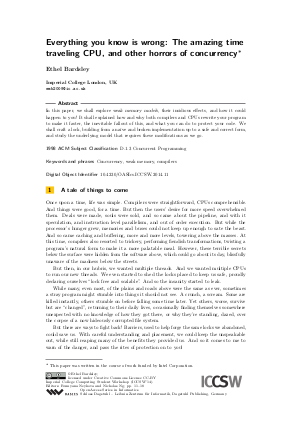Everything you know is wrong: The amazing time traveling CPU, and other horrors of concurrency
Author Ethel Bardsley
-
Part of:
Volume:
2014 Imperial College Computing Student Workshop (ICCSW 2014)
Part of: Series: Open Access Series in Informatics (OASIcs) - License:
 Creative Commons Attribution 3.0 Unported license
Creative Commons Attribution 3.0 Unported license
- Publication Date: 2014-10-08
File

PDF
OASIcs.ICCSW.2014.11.pdf
- Filesize: 0.85 MB
- 8 pages
Document Identifiers
Subject Classification
Keywords
- Concurrency
- weak memory
- compilers
Metrics
- Access Statistics
-
Total Accesses (updated on a weekly basis)
0PDF Downloads0Metadata Views
Abstract
In this paper, we shall explore weak memory models, their insidious effects, and how it could happen to you! It shall explained how and why both compilers and CPUs rewrite your program to make it faster, the inevitable fallout of this, and what you can do to protect your code. We shall craft a lock, building from a naïve and broken implementation up to a safe and correct form, and study the underlying model that requires these modifications as we go.
Cite As Get BibTex
Ethel Bardsley. Everything you know is wrong: The amazing time traveling CPU, and other horrors of concurrency. In 2014 Imperial College Computing Student Workshop. Open Access Series in Informatics (OASIcs), Volume 43, pp. 11-18, Schloss Dagstuhl – Leibniz-Zentrum für Informatik (2014)
https://doi.org/10.4230/OASIcs.ICCSW.2014.11
BibTex
@InProceedings{bardsley:OASIcs.ICCSW.2014.11,
author = {Bardsley, Ethel},
title = {{Everything you know is wrong: The amazing time traveling CPU, and other horrors of concurrency}},
booktitle = {2014 Imperial College Computing Student Workshop},
pages = {11--18},
series = {Open Access Series in Informatics (OASIcs)},
ISBN = {978-3-939897-76-7},
ISSN = {2190-6807},
year = {2014},
volume = {43},
editor = {Neykova, Rumyana and Ng, Nicholas},
publisher = {Schloss Dagstuhl -- Leibniz-Zentrum f{\"u}r Informatik},
address = {Dagstuhl, Germany},
URL = {https://drops.dagstuhl.de/entities/document/10.4230/OASIcs.ICCSW.2014.11},
URN = {urn:nbn:de:0030-drops-47688},
doi = {10.4230/OASIcs.ICCSW.2014.11},
annote = {Keywords: Concurrency, weak memory, compilers}
}
Author Details
References
-
Jade Alglave, Daniel Kroening, Vincent Nimal, and Daniel Poetzl. Don't sit on the fence: A static analysis approach to automatic fence insertion. CoRR, abs/1312.1411, 2013.

- Jonathan Corbet. Volatile considered harmful. https://www.kernel.org/doc/Documentation/volatile-considered-harmful.txt. Retreived from Linux 3.15-rc7.
-
Micha Hofri. Proof of a mutual exclusion algorithm—a classic example. ACM SIGOPS Operating Systems Review, 24(1):18-22, 1990.

- David Howells and Paul E. McKenney. Linux kernel memory barriers. https://www.kernel.org/doc/Documentation/memory-barriers.txt. Retreived from Linux 3.15-rc7.
-
Jeff Huang, Charles Zhang, and Julian Dolby. Clap: Recording local executions to reproduce concurrency failures. In Proceedings of the 34th ACM SIGPLAN Conference on Programming Language Design and Implementation, PLDI '13, pages 141-152, New York, NY, USA, 2013. ACM.

-
ISO. Programming Language C (C11). Standard ISO/IEC 9899:2011, International Organization for Standardization, 2011.

-
JCP. JSR 133: JavaTM Memory Model and Thread Specification Revision. Standard, Java Community Process, 2004.

-
L. Lamport. How to make a multiprocessor computer that correctly executes multiprocess programs. IEEE Trans. Comput., 28(9):690-691, September 1979.

-
Scott Owens, Susmit Sarkar, and Peter Sewell. A better x86 memory model: x86-tso. In Theorem Proving in Higher Order Logics, volume 5674 of Lecture Notes in Computer Science, pages 391-407. Springer Berlin Heidelberg, 2009.

-
Gary L. Peterson. Myths About the Mutual Exclusion Problem. Information Processing Letters, 12(3):115-116, 1981.

